Related Research Articles
Video art is an art form which relies on using video technology as a visual and audio medium. Video art emerged during the late 1960s as new consumer video technology such as video tape recorders became available outside corporate broadcasting. Video art can take many forms: recordings that are broadcast; installations viewed in galleries or museums; works either streamed online, or distributed as video tapes, or on DVDs; and performances which may incorporate one or more television sets, video monitors, and projections, displaying live or recorded images and sounds.
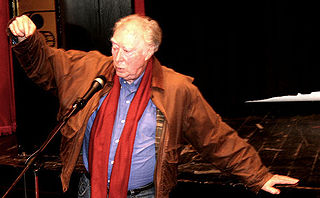
Michael James Aleck Snow was a Canadian artist who worked in a range of media including film, installation, sculpture, photography, and music. His best-known films are Wavelength (1967) and La Région Centrale (1971), with the former regarded as a milestone in avant-garde cinema.
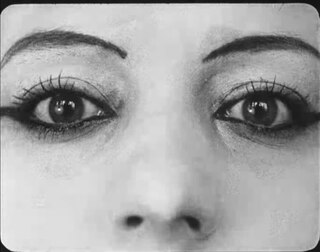
Experimental film or avant-garde cinema is a mode of filmmaking that rigorously re-evaluates cinematic conventions and explores non-narrative forms or alternatives to traditional narratives or methods of working. Many experimental films, particularly early ones, relate to arts in other disciplines: painting, dance, literature and poetry, or arise from research and development of new technical resources.
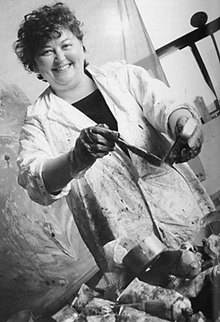
Joyce Wieland was a Canadian experimental filmmaker and mixed media artist. Wieland found success as a painter when she began her career in Toronto in the 1950s. In 1962, Wieland moved to New York City and expanded her career as an artist by including new materials and mixed media work. During that time, she also rose to prominence as an experimental filmmaker and soon, institutions such as the Museum of Modern Art in New York were showing her films. In 1971, Wieland's True Patriot Love exhibition was the first solo exhibition by a living Canadian female artist at the National Gallery of Canada. In 1982, Wieland received the honour of an Officer of the Order of Canada and in 1987, she was awarded the Toronto Arts Foundation's Visual Arts Award. She was also a member of the Royal Canadian Academy of Arts.

Gwendolyn Audrey Foster is an experimental filmmaker, artist and author. She is Willa Cather Professor Emerita in Film Studies. Her work has focused on gender, race, ecofeminism, queer sexuality, eco-theory, and class studies. From 1999 through the end of 2014, she was co-editor along with Wheeler Winston Dixon of the Quarterly Review of Film and Video. In 2016, she was named Willa Cather Endowed Professor of English at the University of Nebraska at Lincoln and took early retirement in 2020.
The Winnipeg Film Group (WFG) is an artist-run film education, production, distribution, and exhibition centre in Winnipeg, Manitoba, committed to promoting the art of Canadian cinema, especially independent cinema.

The Magic Sword is a 1962 American adventure fantasy film directed by Bert I. Gordon that is loosely based on the medieval legend of Saint George and the Dragon.
Peggy Ahwesh is an American experimental filmmaker and video artist. She received her B.F.A. at Antioch College. A bricoleur who has created both narrative works and documentaries, some projects are scripted and others incorporate improvised performance. She makes use of sync sound, found footage, digital animation, and Pixelvision video. Her work is primarily an investigation of cultural identity and the role of the subject in various genres. Her interests include genre; women, sexuality and feminism; reenactment; and artists' books. Her works have been shown worldwide, including in San Francisco, New York, Barcelona, London, Toronto, Rotterdam, and Créteil, France. Starting in 1990, she has taught at Bard College as a Professor of Film and Electronic Arts. Her teaching interests include: experimental media, history of the non-fiction film, and women in film.
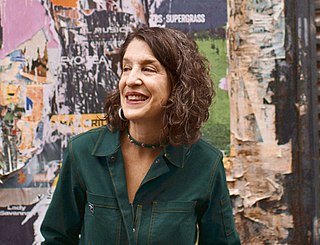
Lynne Sachs is an American experimental filmmaker and poet living in Brooklyn, New York. Her moving image work ranges from documentaries, to essay films, to experimental shorts, to hybrid live performances. Working from a feminist perspective, Sachs weaves together social criticism with personal subjectivity. Her films embrace a radical use of archives, performance and intricate sound work. Between 2013 and 2020, she collaborated with musician and sound artist Stephen Vitiello on five films.
Collage film is a style of film created by juxtaposing found footage from disparate sources. The term has also been applied to the physical collaging of materials onto film stock.
Standish Dyer Lawder was an American artist, art historian and inventor, who contributed to the structural film movement in the late 1960s and early 1970s.
Janine Marchessault is a professor of Cinema and Media Studies and Canada Research Chair (2003-2013) at York University in Toronto, Canada. Her main fields of research are Ecologies of Media and Mediation, (sub)urban cultures, the works of Marshall McLuhan, contemporary art exhibitions, Expo 67, artists' cultures, new media technologies, media archives, city and its sustainability issues. She is also a Trudeau Fellow.

Peggy Gale is an independent Canadian curator, writer, and editor. Gale studied Art History and received her Honours Bachelor of Arts degree in Art History from the University of Toronto in 1967. Gale has published extensively on time-based works by contemporary artists in numerous magazines and exhibition catalogues. She was editor of Artists Talk 1969-1977, from The Press of the Nova Scotia College of Art and Design, Halifax (2004) and in 2006, she was awarded the Governor General's Award in Visual and Media Arts. Gale was the co-curator for Archival Dialogues: Reading the Black Star Collection in 2012 and later for the Biennale de Montréal 2014, L’avenir , at the Musée d’art contemporain de Montréal. Gale is a member of IKT, AICA, The Writers' Union of Canada, and has been a contributing editor of Canadian Art since 1986.
Millefiore Clarkes, is a Canadian filmmaker from Prince Edward Island. She has produced music videos, experimental shorts and documentary films, as well as commercials. She also owns and operates One Thousand Flowers Productions. The name of the film production company is derived from her first name, which means "one thousand flowers" in Italian.
Birthday Suit – with scars and defects (1974) is a thirteen-minute black and white video art tape by Canadian artist Lisa Steele. It is her best known early work and depicts Steele "present[ing] her naked body to the unblinking gaze of the camera".
Christina Battle is a video and installation artist who was born in Edmonton, Alberta, Canada. She holds a Master of Fine Arts from the San Francisco Art Institute and a certificate in Film Studies from Ryerson University. She also holds a Bachelor of Science from the University of Alberta.
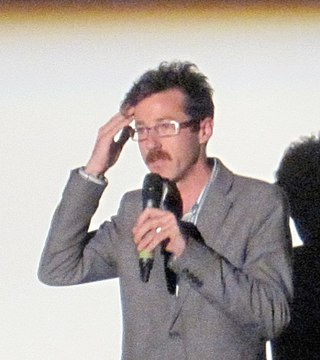
Daniel Ernest Cockburn is a Canadian performance artist, film director and video artist. Cockburn won the Jay Scott Prize in 2010 and the European Media Art Festival's principal award in 2011 for his debut feature film You Are Here.
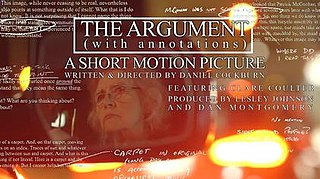
The Argument (With Annotations) is a 2017 Canadian-British short experimental drama film written, directed, and edited by video artist Daniel Cockburn. The short's first half attempts to deceive the audience into thinking it is a non-fictional video essay, revealing itself mid-way to be a work of fiction, the essay actually the work of the film's protagonist, an elderly professor (Clare Coulter). Submitted as Cockburn's thesis for the degree of Master of Fine Arts in Film studies at York University, the film had its world premiere at the 42nd Toronto International Film Festival, and has been warmly received by critics.

Louise Bourque is a Acadian French Canadian experimental filmmaker.
Stephen Broomer is a Canadian experimental filmmaker, film scholar and video essayist.
References
- 1 2 3 A Conversation With Christine Lucy Latimer - Black Flash Magazine
- ↑ Christine Lucy Latimer - Digital America
- ↑ Christine Lucy Latimer, Media Archeologist - Pleasure Dome
- 1 2 3 MUBI
- 1 2 3 4 5 6 7 8 9 10 11 Letterboxd
- ↑ Open City Cinema presents: Stephen Broomer vs. Toronto|Experimental Cinema
- ↑ Fragile Systems: Films and Videos by Christine Lucy Latimer|Cinema Studies Institute